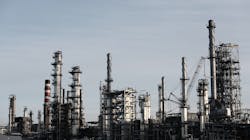U.S. chemical manufacturers say persistent, and in some cases worsening, supply-chain problems are having a detrimental impact on their operations.
According to survey results recently released by the American Chemistry Council (ACC), the impacts of supply-chain disruptions and transportation constraints for many companies are wide-ranging and occurred in all regions of the United States.
The survey was conducted to gain a better understanding of the scale supply-chain and transportation issues that ACC member companies experienced and how they impacted operations. Highlights of the survey include the following topline findings:
- Almost all companies (98%) reported modifying operations because of supply-chain/transportation issues.
- Two-thirds reported lost production and nearly all reported shipping delays (94%), shortages of raw materials (94%), and increased transportation costs (93%).
- Over the last year, more than one-third of companies experienced or declared force majeure because of supply-chain/freight transportation issues.
- Over the same period, nearly all (93%) companies reported additional costs into the several millions of dollars. Estimates ranged from $100,000 to $250 million, with more than a third of companies reporting costs higher than $20 million.
Supply-chain problems are a critical issue for ACC and its members because chemical shipments represent a large share of the overall total shipments for marine, truck, and rail transportation. The stakes are expected to only get higher as ACC’s economists anticipate that chemical shipments and the industry’s transportation needs will increase this year and into the future.
“Our industry forecasts for 2022 anticipate significant growth in chemical production and shipments, which heightens the urgency for untangling ongoing supply-chain issues,” said Martha Moore, ACC’s chief economist. “Our member companies have made it very clear that widespread problems across all modes of transportation created an unwelcome and very disruptive environment for chemical manufacturers.”
Several initiatives that President Biden and Congress put in place over the past year are helping move more cargo and address supply-chain constraints for chemical manufacturers, ACC said. Those initiatives include extended service hours and additional funds for improvements at port facilities and recruitment programs to help get more truck drivers on the road.
As part of its effort to rebuild America’s infrastructure, the federal government must place a greater emphasis on resolving freight transportation problems. ACC joined with several other industry groups to advance additional policies aimed at fixing these problems by helping promote greater competition between freight carriers and increasing capacity for truck and marine shipments.
Specifically, the council is calling on Congress to pass the Ocean Shipping Reform Act of 2021, urging Congress to pass legislation to improve capacity for trucking by increasing gross vehicle weights on federal interstates, and pushing the Surface Transportation Board to allow greater access to competitive and reliable freight rail service.
“The supply-chain problems impacting our member companies simply didn’t disappear at the stroke of midnight on New Year’s Eve. Unfortunately, they will carry over well into 2022,” said Chris Jahn, president and CEO of ACC. “President Biden and Congress have made modest progress, but now is not the time to let up. To put these systemic supply-chain problems behind us, we must continue to move forward on additional policy reforms that will unlock the full capability of the entire freight transportation network.”
